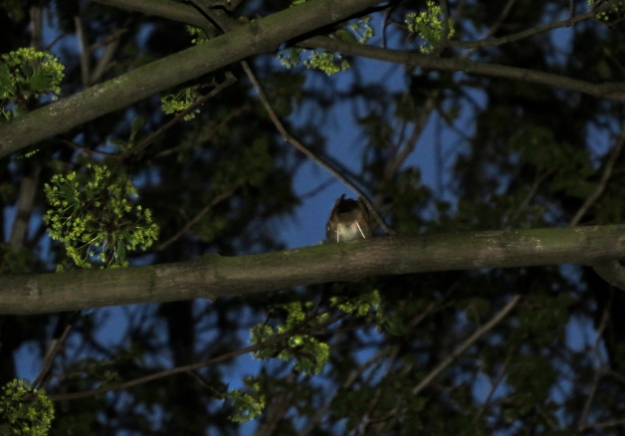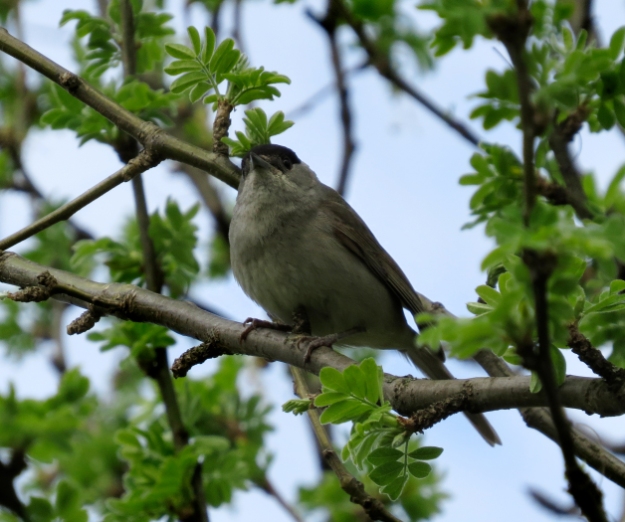 I caught this Grey Heron catching a fish in the Spree yesterday evening.
I caught this Grey Heron catching a fish in the Spree yesterday evening.
Tag Archives: Spree
Mother Mallard and Chicks
Pigeon with Pants
Whitethroat and Blackcap
 Trying to get a photograph of these lively little birds is an exercise in frustration. They hate to stop in one place for more than three seconds and they flit from tree to tree with very little commotion. One hears only their calls, coming first from here, then from over there, and then from here again, like sounds in a funhouse. But I caught this one! Ha! He is a lesser whitethroat who arrived from Africa a few weeks ago and took up residence near the Spree. Living nearby is his relative, the blackcap, who flits around in the same way but sings a very beautiful song all the while. Here these birds are known as Grasmücke. The blackcap is the Monchsgrasmücke, because of his garb, and the white throat is the Klappergrasmücke, because of the chattery nature of his call.
Trying to get a photograph of these lively little birds is an exercise in frustration. They hate to stop in one place for more than three seconds and they flit from tree to tree with very little commotion. One hears only their calls, coming first from here, then from over there, and then from here again, like sounds in a funhouse. But I caught this one! Ha! He is a lesser whitethroat who arrived from Africa a few weeks ago and took up residence near the Spree. Living nearby is his relative, the blackcap, who flits around in the same way but sings a very beautiful song all the while. Here these birds are known as Grasmücke. The blackcap is the Monchsgrasmücke, because of his garb, and the white throat is the Klappergrasmücke, because of the chattery nature of his call.
Crow’s Nest
 These hooded crows have a fine location on a newly trimmed branch of a weeping willow tree that extends over the Spree. Here they are feeding their chicks.
These hooded crows have a fine location on a newly trimmed branch of a weeping willow tree that extends over the Spree. Here they are feeding their chicks.
Gathering
The rear end of a nightingale
The nightingales are back! As of three nights ago we have been hearing their wild songs from our apartment, and a quick walk yesterday evening brought us by at least three of them belting it out with all they have. These little birds are notoriously difficult to photograph. They like to hide in thickets and dense foliage and prefer to sing only when the dusk is advancing. But thanks to my awesome new camera I was able to capture the back side of a singing nightingale last night. So here you have it, a nightingale’s butt:
If you’d like to hear his crazy song, it is recorded here. And here you can hear some strange croaking noises that he made.
If you’d rather not look at his butt while listening, here is a lovely picture of last night’s full moon.
More listening
Today I noticed that my camera battery had died, just after I left the house to go observing. This turned out to be a good thing, as I decided to focus on listening again, and to see if I could identify not only every bird that I saw, but also every bird that I heard. I walked by the Spree, where in the past months the waterfowl would be hanging around in their usual spots. But now, thanks to the constant parade of pleasure boats that churn up and down the river as soon as the weather improves, there was hardly a duck or coot to be seen, and no more swans or grebes or moorhens at all. (Many of these seem to have relocated to the pond in the Englischer Garten.)






